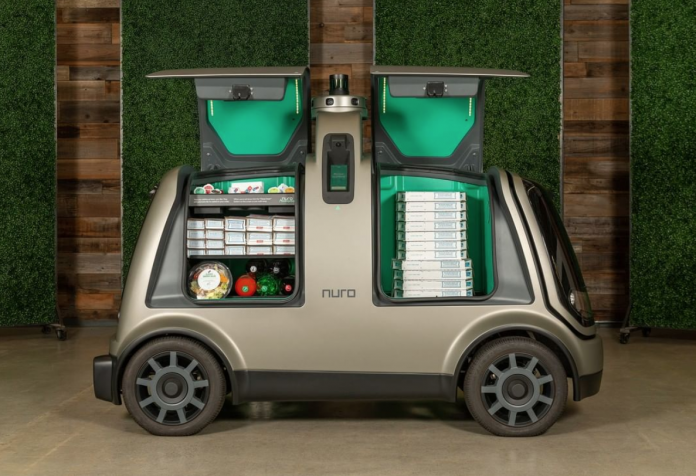
Meet Nuro’s Electric-Powered Delivery Robot
By Desiree Homer
Soon, Houston residents will start seeing driverless delivery vehicles. The National Highway Traffic Safety Administration approved for the first time, the deployment of up to 5,000 low-speed cars, earlier this month. Nuro, Inc. will have a two-year period to launch its local delivery service, designed to partner with restaurants and grocery stores. What do a test-run and a federal agency approval like this mean for your markets?
The First Decision of its Kind
No other U.S. regulating agency has made a decision in this segment like this before. The NHTSA, earlier this month, granted permission to Nuro, Inc. to roll out its self-driving vehicles. The R2 vehicle will operate at incredibly slow speeds, without a driver and completely autonomous. Nuro officials call this decision a “milestone for the industry.” The robotics company says consumers waste tons of time running errands. Offering a solution and a future where “everything comes to you, on-demand, and free” is the company vision.
The Nuro Delivery Robot Plan
Nuro, Inc. is a privately held company in Mountain View, California, that specializes in robotics. The plan, recently earning NHTSA approval, is to launch 5,000 autonomous vehicles as part of a delivery program in Houston, Texas. Nuro is prepared to start road testing in the coming weeks. With participating from Walmart and Domino’s Pizza, the Nuro R2 cars will deliver groceries and pizzas in Houston as part of this pilot project. The company previously worked with Kroger stores, over the last two years, on a similar grocery delivery roll-out, in Scottsdale, Arizona.
What This Self-Driving Vehicle Looks Like
The R2 vehicle itself is about half the width of an average car and has no seating positions nor steering wheel. It will have uniquely fitting gull-wing cargo doors and about 65% more compartment and cargo space than its earlier R1, concept. There will be temperature controls, explicitly designed to keep groceries fresh along the commute. Also included in this delivery-mobile will be a large battery pack with all-day driving capabilities. The R2 is ultimately classified as a low-speed vehicle, meaning it doesn’t have to measure up to the safety requirements of regular or more traditional vehicles.
Impact on Dealerships
If the pizza delivery guys aren’t worried about complete robotic replacement just yet, your dealership probably won’t have anything worry about either. For now, Nuro’s delivery car is a test-run. In the worst-case scenario, it’s a disaster, and people go back to having to run their own errands themselves. At best, this autonomous delivery car is a huge success, and people don’t use their own vehicles for errands anymore. In either case, it may take years before dealerships have to incorporate any changes in how they sell or service vehicles. What should be of higher importance to your operations, is recognizing that for the first time, a government agency has given the green light for testing of the completely new, autonomous vehicle market. Be prepared for increased legislation at various levels, and for new technologies that change how people engage with their vehicles. But, if you’re in Houston, your pizza and grocery delivery just got a whole lot cooler.












